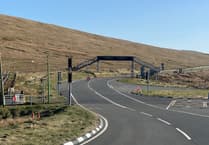A review has found that it is difficult to measure the success of the government’s active travel strategy due to a lack of baseline data.
A report looking into the government’s 2018 to 2021 Active Travel Strategy has been published.
The review, undertaken by Tynwald’s environment and infrastructure policy review committee, revealed issues of funding and data measurement.
The aim is that issues identified in the review will be considered for the upcoming 2023 to 2028 active travel policy and strategy,
The active travel strategy provided a framework to encourage people in the island to make regular everyday journeys by more active means, such as cycling or walking.
It was a product of the 2016 to 2021 programme for the government to increase the number of people using walking and cycling to get around.
The Department of Infrastructure set a target of ‘increasing the participation in active travel from 14% in 2011 to 30% in 2025, with an interim target of 20% in 2020.
The review found that ‘the lack of baseline travel data has proved a limitation for monitoring progress and thus has made measuring success levels difficult.’
The review quotes Dr Henrietta Ewart, head of public health at the time, who said: ‘The 2018-21 strategy has been a missed opportunity where a more rigorous approach to objective setting, project management and holding to account for both process and outcome could have achieved more.
‘As it is, I find it difficult to articulate exactly what has been achieved.’
Another key issue identified was a lack of funding.
In 2018, when the initiative started, £3.8 million was approved by Tynwald to support delivery, which was reduced to £2.5 million in the 2021 budget, the department confirmed to the review committee that £2,507982.79 was spent on the initiative.
In the 2022 budget, £15,000 was allocated to active travel, with the review stating: ‘It is apparent that substantial funding was discontinued in 2021 when the strategy came to the end of its lifecycle.’
In July 2022, the department stated that work related to active travel is ongoing.
Chris Thomas, Minister for Infrastructure, said: ‘Officers in the highways division continue to improve the highways network with things like road crossings, traffic-free routes and better pavements to try to encourage people to walk and cycle for everyday journeys like going to work and to school, so-called active travel, as well as promoting walking and cycling for leisure.
‘Figures from the beginning of 2022 suggest some success with this encouragement and promotion but one constraint remains budget, for instance funding was insufficient for the three bridges project on the old railway line.’
The figures that the minister refers to, taken from the National Highways and Transport Network Survey 2021, reported daily active travel to work in 28% of respondents.
He added: ‘Government is currently preparing a response to the Tynwald committee review and this response will be debated in May 2023 Tynwald alongside the review report.
‘Members seem unaware of the huge participation of people like education and public health in active travel strategy development and implementation.’

-(1).jpeg?width=209&height=140&crop=209:145,smart&quality=75)
.png?width=209&height=140&crop=209:145,smart&quality=75)

